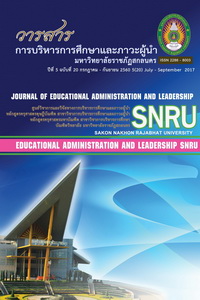

รูปแบบการบริหารแบบมีส่วนร่วมในการพัฒนาจิตลักษณะทางวิทยาศาสตร์ ของนักเรียนที่มีความสามารถพิเศษโรงเรียนจุฬาภรณราชวิทยาลัยเลย
Participatory Administrative Model for Gifted Students’ Scientifically Psychological Characteristics Development at Princess Chulabhorn’ College, Loei
ผู้แต่ง
เยี่ยมลักษณ์ เอี่ยมศิริ, สมศักดิ์ สีดากุลฤทธิ์, ภิญญาพันธ์ เพียซ้าย, ศักดินาภรณ์ นันที
บทคัดย่อ
การวิจัยนี้มีวัตถุประสงค์คือ 1) เพื่อศึกษาจิตลักษณะทางวิทยาศาสตร์ของนักเรียนที่มีความสามารถพิเศษ 2) เพื่อสร้างรูปแบบการบริหารแบบมีส่วนร่วมในการพัฒนาจิตลักษณะทางวิทยาศาสตร์ของนักเรียน 3) เพื่อทดลองใช้ชุดการเรียนรู้สำหรับการพัฒนาจิตลักษณะทางวิทยาศาสตร์ของนักเรียน และ 4) เพื่อประเมินรูปแบบการบริหารแบบมีส่วนร่วมในการพัฒนาจิตลักษณะทางวิทยาศาสตร์ของนักเรียนใช้ระเบียบวิธีวิจัยแบบการวิจัยและ โดยกลุ่มเป้าหมายสำหรับข้อมูลเชิงคุณภาพประกอบด้วยผู้บริหารโรงเรียน ครู และผู้เชี่ยวชาญด้านวิทยาศาสตร์ จำนวน 7 คน ส่วนกลุ่มเป้าหมายสำหรับข้อมูลเชิงปริมาณเป็นนักเรียนชั้นมัธยมศึกษาปีที่ 1 โรงเรียนจุฬาภรณราชวิทยาลัยเลย จำนวน 192 คน และคัดเลือกมาเป็นกลุ่มตัวอย่างในขั้นการทดลอง จำนวน 60 คน โดยสุ่มเป็นกลุ่มทดลองจำนวน 30 คน และกลุ่มควบคุมจำนวน 30 คน เครื่องมือที่ใช้ในการวิจัยประกอบด้วย 1) ชุดการเรียนรู้สำหรับการพัฒนาจิตลักษณะทางวิทยาศาสตร์ของนักเรียนที่มีความสามารถพิเศษ จำนวน5 โมดูล 2) แบบสอบถามเกี่ยวกับจิตลักษณะทางวิทยาศาสตร์ จำนวน 3 ชุด การวิเคราะห์ข้อมูลเชิงคุณภาพ ใช้การวิเคราะห์เชิงเนื้อหา ส่วนการวิเคราะห์ข้อมูลเชิงปริมาณประกอบด้วย ความถี่ ร้อยละ ค่าเฉลี่ย ส่วนเบี่ยงเบนมาตรฐานและการทดสอบค่าที
ผลการวิจัย พบว่า
1. จิตลักษณะทางวิทยาศาสตร์ของนักเรียนที่มีความสามารถพิเศษก่อนดำเนินการพัฒนา 3 ด้านมีผลดังนี้ 1.1) ความผูกพันในบทบาทนักเรียนวิทยาศาสตร์อยู่ในระดับต่ำ จำนวน 33 คน (ร้อยละ 34.38) ระดับกลาง จำนวน 29คน (ร้อยละ 30.20) และระดับสูง จำนวน 34 คน (ร้อยละ 35.42) 1.2) เอกลักษณ์นักเรียนวิทยาศาสตร์อยู่ในระดับต่ำ จำนวน 28 คน (ร้อยละ 29.17) ระดับกลาง จำนวน 36คน (ร้อยละ 37.50) และระดับสูง จำนวน 32 คน (ร้อยละ 33.33) 1.3) พฤติกรรมการแสวงหาความรู้ทางวิทยาศาสตร์อยู่ในระดับต่ำ จำนวน 79 คน
(ร้อยละ 82.29) ระดับกลาง จำนวน17คน (ร้อยละ 17.71)
2. รูปแบบการบริหารแบบมีส่วนร่วมในการพัฒนาจิตลักษณะทางวิทยาศาสตร์ของนักเรียนที่มีความสามารถพิเศษ ประกอบด้วย 4 ขั้นตอน1) การร่วมวางแผนออกแบบกิจกรรม 2) การร่วมพัฒนาชุดการเรียนรู้ 3) การร่วมจัดกิจกรรมการเรียนรู้ 4) การร่วมประเมินผลการเรียนรู้ โดยมีชุดการเรียนรู้สำหรับพัฒนาจิตลักษณะทางวิทยาศาสตร์ 5 โมดูล คือ 1) การมีปฏิสัมพันธ์กับครูวิทยาศาสตร์ 2) การมีปฏิสัมพันธ์กับเพื่อนนักเรียนวิทยาศาสตร์ 3) การมีปฏิสัมพันธ์กับรุ่นพี่ที่ประสบความสำเร็จด้านวิทยาศาสตร์ 4) การมีปฏิสัมพันธ์กับผู้ประกอบการที่เกี่ยวข้องกับวิทยาศาสตร์ และ 5) การมีปฏิสัมพันธ์กับนักวิทยาศาสตร์ โดยชุดการเรียนรู้มีค่าความตรงเชิงเนื้อหาอยู่ระหว่าง ร้อยละ 80.00-82.00
3. ผลการทดลองใช้ชุดการเรียนรู้สำหรับพัฒนาจิตลักษณะทางวิทยาศาสตร์พบว่า นักเรียนในกลุ่มทดลอง มีคะแนนจิตลักษณะทางวิทยาศาสตร์ โดยภาพรวมและรายด้านภายหลังการเรียนสูงกว่าก่อนเรียนอย่างมีนัยสำคัญทางสถิติที่ระดับ .05 และนักเรียนในกลุ่มทดลองมีคะแนนจิตลักษณะทางวิทยาศาสตร์ภายหลังการเรียนโดยภาพรวมและรายด้านสูงกว่านักเรียนในกลุ่มควบคุมอย่างมีนัยสำคัญทางสถิติที่ระดับ .05
4. ผลการประเมินรูปแบบ พบว่า การประเมินโดยภาพรวมและรายด้าน จำนวน 4 ด้านประกอบด้วย 1) ด้านความเหมาะสม 2) ด้านความเป็นไปได้ 3) ด้านอรรถประโยชน์และ 4) ด้านความถูกต้อง โดยมีผลการประเมินอยู่ในระดับมาก
Abstract
This research aimed to 1) to study the gifted students’ psychological characteristics of Science, 2) to construct the participatory administrative model to develop the gifted students’ psychological characteristics of science, 3) to trial the learning packages to develop the gifted students’ psychological characteristics, and 4) to evaluate the participatory administrative model. The 7 participants for target group of the qualitative approach consisted of school principal, teachers and scientific experts whilst the target group for the quantitative approach were 192 Mattayomsuksa students 1 of Princess Chulabhorn’s College, Loei. Among those students 60 students were selected and 30 students were randomized for experimental group and another 30 students were controlled group. The research instruments consisted of 1) 5 modules of the learning package to develop the gifted students’ psychological characteristics of science, and 2) 3 sets of the questionnaires about psychological characteristics of science. The qualitative data were analyzed by content analysis and the quantitative data were analyzed by frequency, percentage, standard deviation and t-test.
The following results were found :
1. The gifted students’ psychological characteristics of science before performing, the development in 3 aspects were showed as follows. 1.1) The commitment to role of science student, it was obviously found that 33 science students (34.38 percent) were at a low level, 29 science students (30.20 percent) were at a moderate level and 34 science students (35.42 percent )were at a high level. 1.2) For the science student identity, it was evidently found that 28 students (29.17 percent) were at a low level, 36 students (37.50 percent) were at a moderate level and 32 students (33.33 percent) were at a high level. And 1.3) The information seeking behavior in science, the result showed that 79 students (82.29 percent) were at a low level, and 17 students (17.71 percent) were at a moderate level.
2. The participatory administrative model to develop the gifted students’ psychological characteristics of science consisted of 4 steps :1) the participation in planning the activity designม 2) the participation in the learning package development, 3) the participation in learning activity management, and 4) the participation in learning assessment. The learning package to develop the gifted students’ psychological characteristics of science consisted of 5 modules : 1) the interactions with the science teachers, 2) the interactions with peers in science, 3) the interactions with science alumni students who achieved in science, 4) the interactions with science entrepreneurs, and 5) the interactions with scientist. The content validity of the learning package was 80.00- 82.00 percent.
3. The trial results of the learning packages to develop the gifted students’ psychological characteristics clearly found in overall aspect and by aspect that after learning the students in the experimental group got higher scores of the psychological characteristics than before learning with the statistical significance at .05 level. In addition, it was evidently found that the students in the experimental group’s psychological characteristics score in overall aspect and by aspect were higher than the students’ in the controlled group with the statistical significance at .05 level.
4. For the model evaluation, the results revealed in overall and by aspect evaluated in 4 aspects : 1) propriety; 2) feasibility; 3) utility; and 4) accuracy which were distinctly found at a high level.
คำสำคัญ
รูปแบบการบริหารแบบมีส่วนร่วม, จิตลักษณะทางด้านวิทยาศาสตร์Keyword
Participatory Administrative Model, Scientifically Psychological Characteristics DevelopmentNotice: Undefined variable: dataSet in /var/www/html/ArticleView.php on line 116
Notice: Trying to access array offset on value of type null in /var/www/html/ArticleView.php on line 116
บทความทุกบทความเป็นลิขสิทธิ์ของ
Notice: Undefined variable: dataSet in /var/www/html/ArticleView.php on line 116
Notice: Trying to access array offset on value of type null in /var/www/html/ArticleView.php on line 116
เท่านั้น
กำลังออนไลน์: 7
วันนี้: 549
เมื่อวานนี้: 7,862
จำนวนครั้งการเข้าชม: 1,218,261
อาคารบัณฑิตวิทยาลัย ชั้น 2 ตำบลธาตุเชิงชุม อำเภอเมือง จังหวัดสกลนคร 47000
โทร/
แฟกซ์ 0-4297-0093
บรรณาธิการ: รองศาสตราจารย์ ดร.ไชยา ภาวะบุตร
ติดต่อ/สอบถาม: นายธีรเวทย์ เพียรธัญญกรณ์
โทร: 0-4297-0093